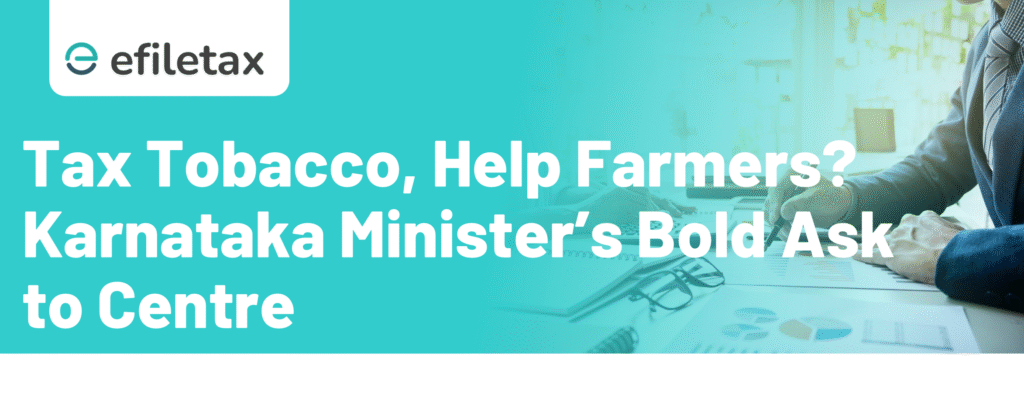
Should Tobacco Tax Revenue Be Used for Farmers? Karnataka’s Minister Thinks So
The Karnataka Minister for Animal Husbandry and Sericulture has urged the Central Government to use tax money collected from tobacco sales to support sericulture and farming communities in the state.
Let’s break it down in simple terms for Indian taxpayers and professionals.
Understanding Tobacco Tax Revenue in India
- It is classified under sin goods, attracting:
- 28% GST
- Additional Compensation Cess (e.g., ₹4,170 per 1000 cigarettes)
- Pre-GST excise duties may also apply to certain tobacco forms.
- In FY 2023-24, the GST Compensation Cess from tobacco products alone crossed ₹50,000 crore (as per CBIC data).
👉 Source: CBIC Revenue Data – cbic-gst.gov.in
What the Karnataka Minister Proposed
- The Minister stated that Karnataka farmers, especially silk growers, are under severe distress.
- He urged the Union Government to allocate a portion of tax collected from tobacco to schemes benefitting farmers in regions where tobacco is a primary crop.
- He emphasized the irony that tobacco-growing regions are tax contributors but receive minimal direct benefits from the proceeds.
Is It Legally Possible to Allocate Sin Tax for Welfare?
Constitutional & Legal Scope
| Law/Provision | Summary |
|---|---|
| Article 270 (2) | Taxes collected under GST are distributed between Centre and States. |
| Article 282 | Both Centre and States can spend on public purposes, even outside their legislative domain. |
| GST Compensation Cess Act, 2017 | Proceeds are used to compensate states for revenue loss post-GST rollout. Not earmarked for agriculture. |
| Finance Ministry Guidelines | Taxes are pooled and allocated via Budget provisions, not tied to specific source of collection. |
Can the Centre Use Tobacco Tax for Farmers?
Yes, but through policy allocation, not direct earmarking.
Possible Mechanisms:
- Announce a centrally sponsored scheme funded from general revenue (which includes sin taxes).
- Create a budgetary provision under the Ministry of Agriculture or MSME targeting tobacco-farming zones.
- Allocate grants via Rashtriya Krishi Vikas Yojana (RKVY) or the Sericulture Development Programme.
“While earmarking tax from harmful products like tobacco for health is standard globally, using it to uplift the very communities producing them—when done transparently—can reduce economic dependence on such crops.”
— Senior Economist, NITI Aayog (paraphrased)
Will This Affect GST Structure?
The demand is fiscal, not regulatory.
However, if adopted, it may:
- Set a precedent for region-specific tax-benefit mapping
- Trigger similar demands from other sin-tax-generating regions (like alcohol-producing states)
Final Thoughts: Should Tobacco Tax Help Karnataka Farmers?
The government must weigh:
- Health priorities vs. farmer welfare
- Transparent use of public money
- Avoiding implicit encouragement of tobacco production
FAQ: Tobacco Tax & Farmer Support in India
Q1. Can GST cess from tobacco be used for farming?
Technically, yes—but only through budget allocations, not directly.
Q2. Is there a precedent of sin tax used for welfare?
Yes, globally and in India, sin taxes fund health, education, or welfare programs, but not always in the same sector.
Summary
Karnataka Minister suggests using tobacco tax revenue to support farmers. Legally possible via budget allocation, but not directly earmarked. The move may help tobacco-growing communities if backed by policy.